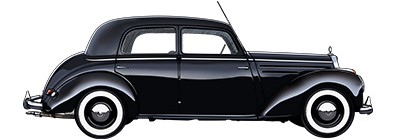The fascination of classic cars -
why is old metal so popular?
Where does the fascination for classic cars come from? What motivates someone to buy a vehicle that is 30 years old or more? After all, new cars are more reliable, faster and less prone to repair! The total number of classic cars has been rising steadily for years. Why is that and why is old metal so popular? We want to get to the bottom of it.
Classic cars are cultural assets that touch the soul
Classic cars are not a means to an end to get from A to B quickly. Rather, they are valuable cultural assets that are cherished and cared for and fill their owners with great pride. They offer little comfort, consume more petrol and are nevertheless charming! Who doesn't feel magically drawn to the sight of a Roadster 300 SL Gullwing, a Mercedes tailfin or a Ponton saloon? Small cars from decades long gone, such as the Fiat 500, the VW Beetle or the Citroën duck, touch the soul. For some it's memories of childhood and youth, for others it's the magic of bygone eras. Against this background, it is not surprising that many people succumb to this "fascination with classic cars".
Classic cars are contemporary witnesses of their era
Many a passionate collector of classic cars knows exactly who drove his car and where his car has been everywhere over the years. A vehicle with a past is worth more to him than a modern new car with a high-tech navigation system and the smell of new leather.
Classic cars are contemporary witnesses of the technical feasibility of their epochs. Just think of the know-how of direct injection, which was first used to build aircraft engines. Or the fact that the dimensions of sheet metal parts in small series were not uniform and had to be painstakingly adjusted afterwards. Every classic car is unique, so to speak!
The fascination of classic cars - the number of classic cars continues to increase
According to the AXA Classic Car Market Review, the USA has the largest classic and vintage car market. It is followed by Europe with the most important markets in Germany, France, Italy and Spain.
According to the VDA, the German Association of the Automotive Industry, more than half a million classic cars with an H registration plate were registered in Germany for the first time in 2020. 11 percent more than in the previous year. Experts assume that the number of oldtimers and youngtimers will continue to increase. Currently, vehicles from 1989 and 1990 dominate the growth in the classic car market.
In addition to all the passion for old cars, the good supply of spare parts is certainly another reason why this hobby is so popular. A look at the financial market shows that a well-preserved oldtimer as an investment can also be quite rewarding. For all experienced mechanics and those who want to become one, our online shop offers an unbeatable range of oldtimer spare parts. Take a look and see for yourself. True to the motto "Preserve before replacing" - long live the "fascination of classic cars"!




